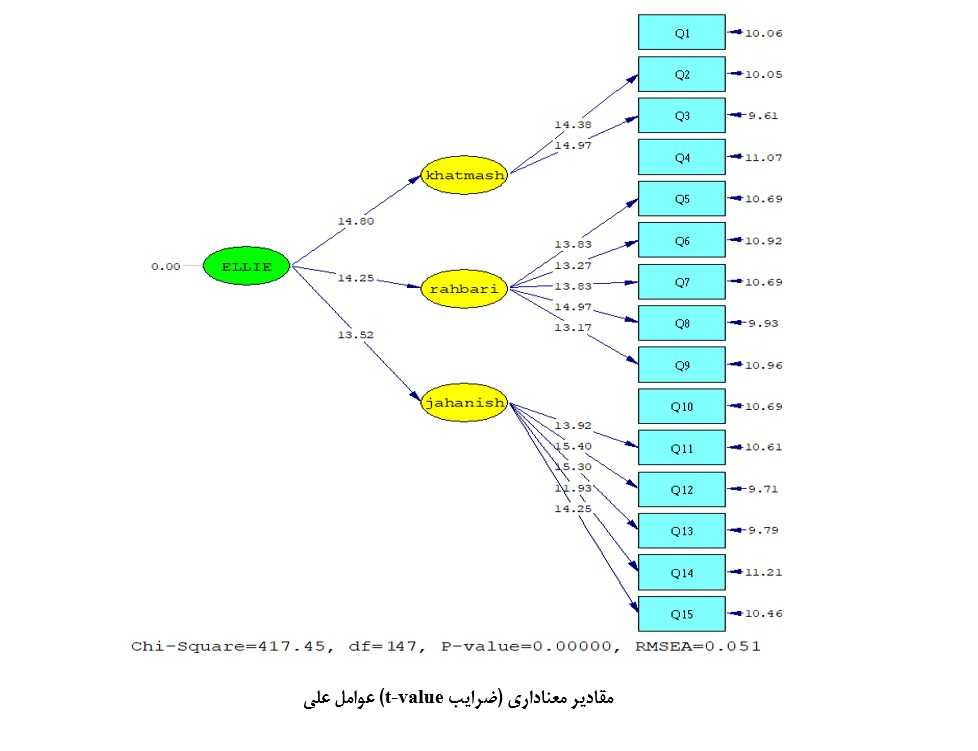اعتبارسنجی مدل توسعه مهارتهای آیندهپژوهی مدیران بانک سپه
کلمات کلیدی:
آیندهپژوهی, مهارتهای مدیریتی, توسعه سازمانی, بانکداری, مدل ساختاریچکیده
هدف مطالعه، طراحی و اعتبارسنجی مدل توسعه مهارتهای آیندهپژوهی مدیران بانک سپه استان البرز است. این پژوهش از نظر هدف کاربردی و از نظر روش، پیمایشی مقطعی بود. جامعه آماری شامل ۹۸۵ نفر از مدیران و کارکنان بانک سپه استان البرز بود که بر اساس جدول کرجسی و مورگان ۲۷۸ نفر انتخاب شدند و در نهایت ۲۸۹ پرسشنامه معتبر گردآوری شد. ابزار گردآوری دادهها پرسشنامه محققساخته شامل ۱۱۲ گویه در قالب ۲۱ مؤلفه و ۶ عامل اصلی بود که روایی آن از طریق خبرگان و پایایی آن با آلفای کرونباخ تأیید شد. دادهها با روش تحلیل عاملی تأییدی و با استفاده از نرمافزارهای SPSS و LISREL مورد تحلیل قرار گرفتند و شاخصهای برازندگی مانند نسبت خیدو به درجه آزادی، RMSEA، GFI و AGFI برای ارزیابی مدل استفاده شد. نتایج تحلیل عاملی تأییدی نشان داد که تمامی مسیرهای مدل در سطح خطای ۰.۰۵ معنادار هستند، زیرا تمام ضرایب t-value خارج از بازه ±1.96 قرار داشتند. بالاترین بار عاملی مربوط به فرهنگ و رفتار سازمانی (0.97) و سپس مهارتهای ارتباطی و ساختار منعطف و چابک بود. تمامی عوامل علی، زمینهای، مداخلهگر، راهبردی و پیامدی روابط معنادار و قوی با متغیر اصلی داشتند. شاخصهای برازش مدل نشاندهنده برازش مطلوب بودند (χ²/df<3، RMSEA<0.08، GFI و AGFI>0.90). نتایج نشان داد که عوامل راهبردی از جمله یادگیری مستمر، مهارت پژوهشی و ارتباطات اثربخش نقش برجستهای در توسعه مهارتهای آیندهپژوهی دارند و پیامدهایی مانند برنامهریزی استراتژیک، خلق ارزش رقابتی و چابکی تصمیمگیری به طور مستقیم تحت تأثیر این مهارتها قرار میگیرند. نتایج مطالعه نشان میدهد که توسعه مهارتهای آیندهپژوهی مدیران در نظام بانکی یک فرایند چندبعدی است که به شدت تحت تأثیر عوامل سازمانی، محیطی و فناورانه قرار دارد و میتواند منجر به چابکی بیشتر، خلق ارزش رقابتی و تصمیمگیری مؤثرتر در بانک شود.
دانلودها
مراجع
Khazaei M. Futures Studies and Strategic Planning in Dynamic Organizations2011.
Hines A. Foresight and futures studies: A strategic compass in times of uncertainty. Journal of Futures Studies. 2020.
Slaughter R, Hines A. The Knowledge Base of Futures Studies 2020: Association of Professional Futurists; 2020.
Rohrbeck R, Kum ME. Corporate foresight and its impact on firm performance: A longitudinal analysis. Technological Forecasting and Social Change. 2021;168:120737.
Mohammadi A, Kazemi F. The Effect of Futures Studies Training on Strategic Decision-Making of Bank Managers. Islamic Banking and Financial Studies Quarterly. 2022;12(1):93-110.
Zhang M, Wang Y, Wang W. Big data analytics managerial skills and organizational agility: A moderated mediation model. Industrial Management Data Systems. 2025;125(1):168-91. doi: 10.1108/IMDS-01-2024-0053.
Tsirkas K, Dimitriadis E, Lassia I. The gap in soft skills perceptions: A dyadic analysis. Education and Training. 2020. doi: 10.1108/ET-03-2019-0060.
Salman A, Singh R, Kumar R. Soft skills and foresight as predictors of organizational performance in Indian banks. International Journal of Bank Marketing. 2020;38(6):1220-38.
Dixit S, Sharma V, Patel R. Future skills integration and digital transformation in BFSI sector: A systematic review. Journal of Banking Innovation Research. 2024;9(2):67-89.
Dixit S, Sharma V, Patel R. Unlocking employee potential in BFSI: A thematic synthesis on soft skills development and its challenges. ACR Journal. 2024.
Ghaffari A, Ahmadi M, Taghavi S. Identifying Futures Studies Components in the Training System for Managers of Government Organizations. Human Resource Development Management Quarterly. 2021;7(2):25-46.
Gholizadeh Zavoshti M, et al. Identifying Key Capabilities of Strategic Foresight in Iranian Banks and Financial Institutions. Government Management Scientific-Research Quarterly. 2019;11(4):55-73.
Mobarakabadi H. The Role of Training Futures Studies Skills in Empowering Organizational Managers. Management Futures Quarterly. 2014;5(2):45-62.
Fallah R, Karimi S. Designing a Strategic Competencies Model for Managers in Iran's Banking Industry. Management and Organizational Transformation Quarterly. 2023;15(2):33-52.
López-Fernández M, Romero-Fernández PM. Competencies and Managerial Skills. International Managerial Skills in Higher Education Institutions: IGI Global Scientific Publishing; 2025. p. 1-16.
Lukash V. The impact of managers' strategic thinking and skills on business process management development: Vilniaus Universitetas; 2025.
Kavand N, Mohammadi Moghadam Y. Analyzing the De-Skilling of Managers in Skill Enhancement in the Era of Digital Transformation. Studies in Smart Business Management. 2025;13(52):47-86.
Ahmed F, Arora P, Khan S. Impact of employees' engagement and knowledge sharing on organisational performance: Study of HR challenges in the COVID 19 pandemic. Human Systems Management. 2020. doi: 10.3233/HSM-201052.
Arefjevs I, Reihmane I, Josifovs J. Financial sector evolution and competencies development in the context of information and communication technologies. Research for Rural Development. 2020. doi: 10.22616/rrd.26.2020.038.
Vecchiato R. Scenario planning, strategic foresight, and emerging technologies: An analysis of the organizational benefits. Futures. 2020;117:102514.
Giorgi G, Lecca L, Perez F. Work related stress in the banking sector and its association with recovery experiences. International Journal of Occupational Medicine and Environmental Health. 2021.
Giorgi G, Lecca L, Perez F. Learning foresight and resilience among European bank employees. European Journal of Management Studies. 2021;26(4):411-27.
Kowalski THP, Loretto W. Well being and HRM in the changing workplace. International Journal of Human Resource Management. 2021.
Nguyen Q, Phan TH, Le NM. Talent conceptualisation and talent management approaches in the Vietnamese banking sector. Journal of Asian Finance, Economics and Business. 2020;7(7):195-204. doi: 10.13106/jafeb.2020.vol7.no7.453.

دانلود
چاپ شده
ارسال
بازنگری
پذیرش
شماره
نوع مقاله
مجوز
حق نشر 2025 Azadeh Ali Barouti Tabar, Naser Abbaszadeh, Hamid Shafizadeh (Author)

این پروژه تحت مجوز بین المللی Creative Commons Attribution-NonCommercial 4.0 می باشد.










